When I encountered Papers, Please for the first time a fortnight ago (credit where it’s due, Indie Statik) I was immediately interested. I’ll confess that I thought the game a potentially interesting concept but what really hooked me in was the fantastic theme played on the main menu; a honking, absurd and melancholic ditty that was striking in its simplicity. Never let it be said that a good song cannot sell your game.
I immediately hopped over to the developer’s site to pick up a copy of the playable alpha build and try the game out for myself. I played, I liked, and I determined to write about it for Arcadian Rhythms. I mailed a few of my Arcadian comrades and mentioned the game, including a crack about how I’m normally way behind the curve when it comes to writing about games – it’s rare that I come straight to new releases, let alone pre-release.
AJ, being AJ, just had to shit on my cornflakes. “Oh yeah, Idle Thumbs covered that recently.”
There I was thinking I was onto something special and I find out that a hugely popular podcast has already covered it.
“Don’t worry about it,” added AJ. “You’re ahead of most people, just not people who do this for a living.”
Huh.
It turns out that Papers, Please had received quite a lot of exposure already. It had become one of those in-development titles that seemingly every organ of gaming news had written about. Finger on the fucking pulse or what? And it’s showing no signs of stopping: it’s already been Greenlit on Steam and even ABC News has covered it (with their article being scraped by Infowars, weirdly enough).
So what more is there to say about a game that’s not yet even been released?
Well, ther- what’s that? What’s the game about? So you haven’t- oh.
Shit. That’s a wasted introduction then.
Papers, Please is an in-development indie PC game that puts you in the cheap shoes of a nameless citizen of Arstotzka whose name has come up in the labour lottery. This citizen has been assigned to a border control office, and so he and his family are uprooted and transported across the country to the border locale of Grestin. This town spans the border between Arstotzka and Kolechia, a country with which a six-year war has just been concluded. Tensions are high and hundreds of dispossessed citizens, fractured families and desperate hopefuls are all seeking to cross the thin line dividing these two countries.
Your job is to inspect for validity and authenticity the documentation handed over by each of the individuals hoping to cross into Arstotzka. Is their passport valid? What about their VISA? Do they have the appropriate supporting documentation? Has anything been falsified? Do their documents correspond with what they are telling you?
By putting you on the clock and tying your daily income to the number of people correctly processed, the game obliges you to make quick decisions. It also requires you to make correct decisions: every time you get it wrong a memo arrives from your superiors informing you what you missed. A few mistakes may be overlooked, but after that your meagre income will be docked – and you need that money to support your family.
It’s not cheap living in a poor, war-torn country like Arstotzka and you need to pay your rent, provide food, keep the heating on, and often buy medicine when your family members fall ill. But your family are not the only human beings you will see suffer: each of the people approaching your desk has their own story, most characterised by varying degrees of tragedy. Some of these stories you will see continued or concluded in the Grestin newspaper each morning; occasionally you will learn more through simply fulfilling your duties; others you will never hear from again. They are just another small piece of human narrative with which you momentarily intersect.
The playable alpha features about eight in-game days of playtime; it will take you a little over an hour to play through it all. It’s enough to give you a taste of what the game has to offer and also to acquaint you with the core mechanics and interactions, as well as how the rules to which you must work can alter day-by-day.
For example, your first full day of work ends prematurely, disrupted by a terrorist attack. A silhouette, bereft of identity, runs from the queuing crowd and hurls an explosive at a border guard, killing him. This nameless individual is shot by guards, his identity a mystery. But the next day the newspapers carry stories of Kolechian extremists, and as you arrive at work your superiors instruct you to turn away all Kolechians.
It’s a simple example, intended to teach the player the type of requests the game may ask of them, but it’s also an example laden with meaning. The arbitrary way in which official rules shift, invariably affecting innocents as a result. The depth of history and hatred between Kolechia and Arstotzka, whether nations or citizenry. The incorporation of such vivid events, such violent and pointless deaths, into the ceaseless bureaucratic machine that is border control. The suggestion of what you will see become commonplace. The threat of jaded cynicism overwhelming empathy.
This is as much a product as the game’s setting as anything else. There are few scenarios that involve such a distinct juxtaposition of human tragedy and monolithic bureaucracy as a border control office between two poor countries, particularly two countries divided by a long war. Papers, Please developer Lucas Pope clearly recognises this, his game so far walking a line between investing its actors with glimpses of their personal history and inviting player empathy, but at the same time requiring that the player dehumanise them, force them to comply with official rules or face penalties, and thereby challenge their authenticity, pick at holes in their story, or even force them to undress and be scanned for contraband.
It is a horrifying yet compelling narrative scenario.
There are risks with a game like Papers, Please. The nations of Arstotzka, Kolechia and the other regional entities are clearly modelled on  the Balkan States and ex-Soviet Bloc nations, from the balkanization and war between nations, the Soviet-style state economy and labour market, and the names of the characters and cities you will see over the course of play. The region even looks a little like the Baltic peninsular. Play begins in 1982, well before the collapse of the USSR (although the game is coy as to whether or not such a superpower exists in its fictionalised setting).
Of course, there is also relevance to contemporary border control with any game like this, be that the constant tensions between the US and Mexico, contemporary politic debate about immigration (particularly when framed in terms of ethnicity) in Europe, the resurgence of the European far right and their trading on related rhetoric, direct action campaigns like Calais Migrant Solidarity and no doubt other parallels or points of similarity in countries with which I am less familiar.
That’s not to mention broader issues such as the international sex and slave trades, nationalism, war, racism, sexism and the ways in which dangerous, fragile scenarios such as these put many of those involved at risk – but particularly the most vulnerable.
Thus far I’ve no reason to believe Lucas Pope will fall short of tackling any of this; the evidence on offer in the alpha all constitutes positive indicators that he is approaching his subject matter with the thoughtfulness, respect and empathy that it deserves. Similarly, there’s no reason as yet to believe that his game will sink into polemicism, tying it too closely to contemporary issues and hindering its own stories as a result. There is even some humour in there, helping to break the mood, although I suspect there will be a darker side to that too.
That aside, it’s easy to wonder about where the game can still go after the alpha’s initial eight days of play. Will the game involve an end state or will the player instead work on endlessly? Perhaps until their family expire, at least, with even the player’s full-time work unable to sustain them. Similarly, will the game be able to sustain interest, telling enough human stories to provoke empathy and providing enough mechanic variation to challenge?
Irrespective of these questions and potential concerns, I am rather excited about the possibilities of this game. I’m keen to see the finished article and I hope that Pope delivers on the promise of his alpha. The odds feel good… certainly better than the odds facing anyone waiting in line at the East Grestin border office.
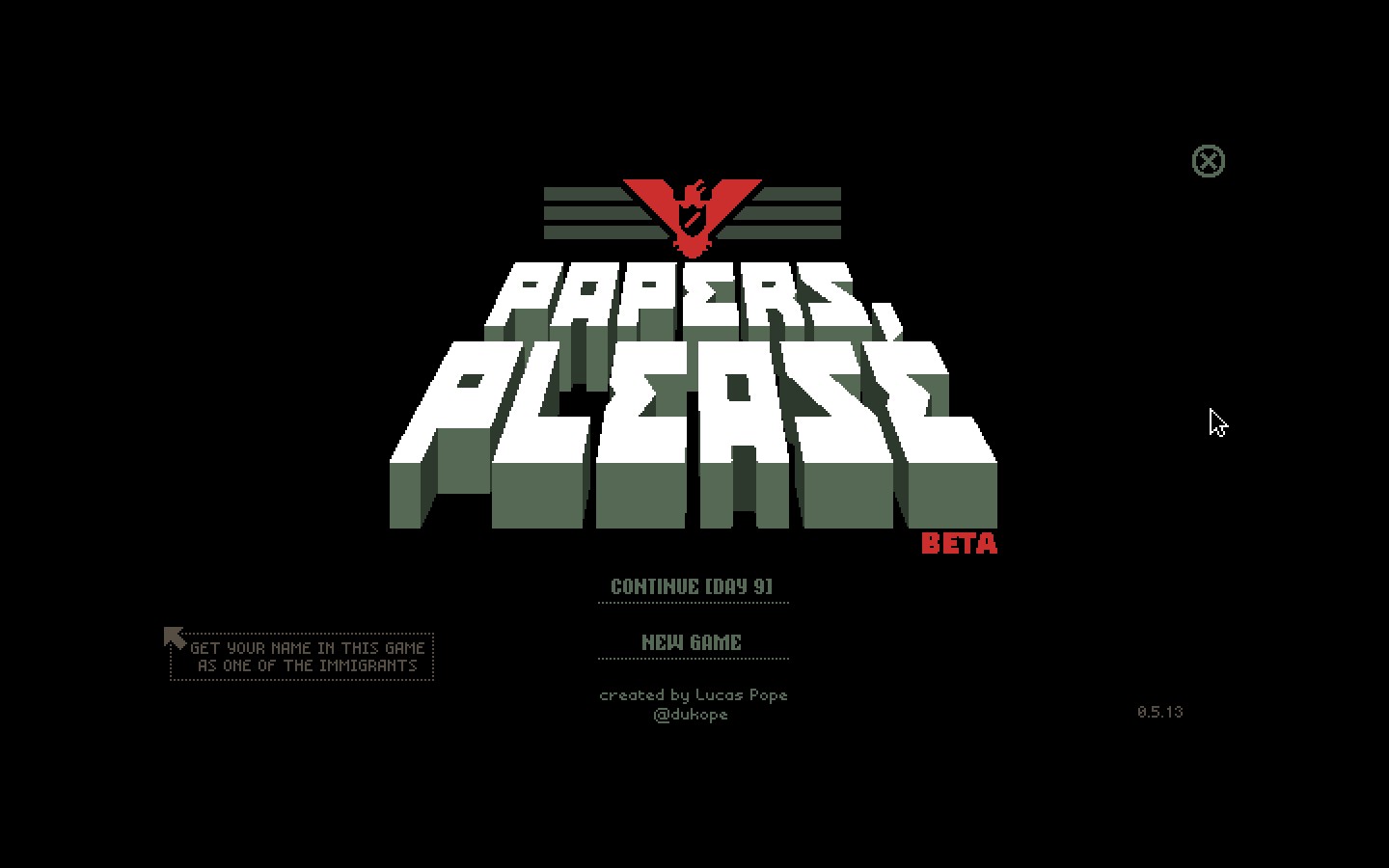
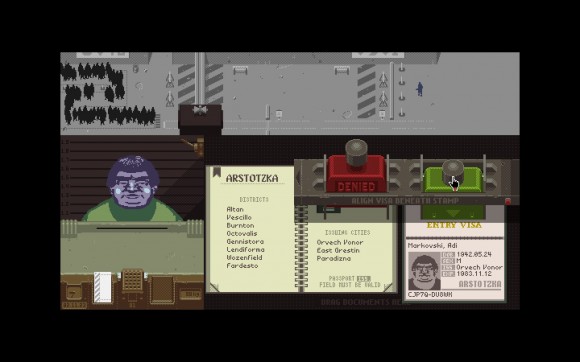
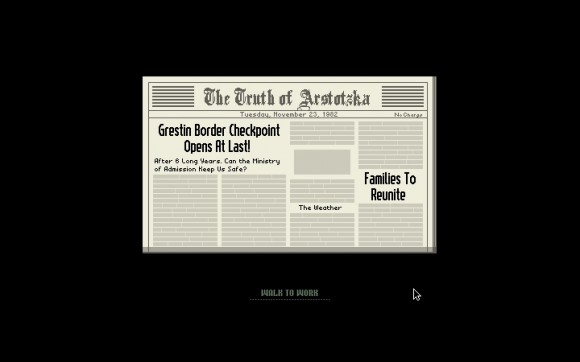
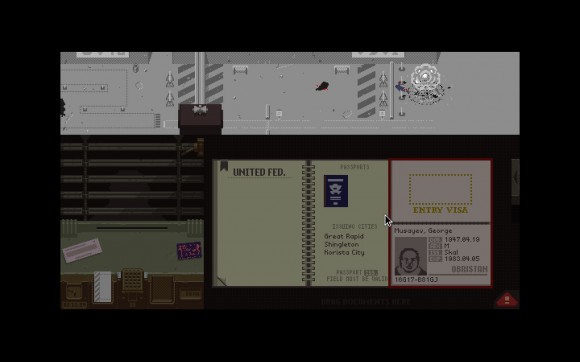
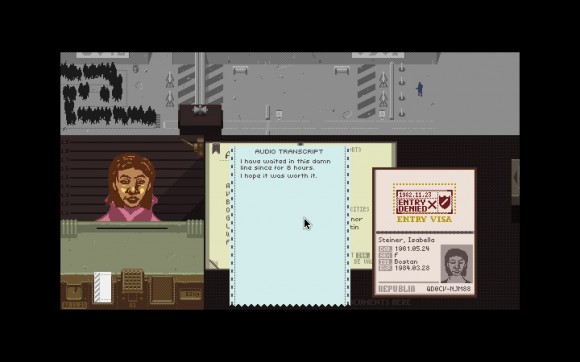
Comments
5 responses to “Initial thoughts: Papers, Please & its exercises in inhumanity”
Wow, this sounds really damn interesting. I can't deny that I'm getting Cart Life vibes from it as well, what with the bleak understated visuals, the very real subject matter and how it ties into the mechanics of the game. Cart Life also featured a crackling chip tune over its main menu which totally sold my friend on the game. Indeed, never say never!
Yet something else to keep my eye on, cheers Shaun! :-P
I would definitely recommend playing a few days of the alpha to get a feel for it. And you're welcome! ;P
(I still need to return to Cart Life. I bought a copy a few weeks ago though, so at least the Hof has some of my cash.)
Wow, I feel like a dick now.
Also, I think that the guys from GiantBomb had also been playing it.
Haha. Sorry dude! You were actually quite nice about it but I wrote the intro to play for laughs. The biggest joke, however, is me thinking I was at the cutting edge for once.
[…] Papers, Please […]